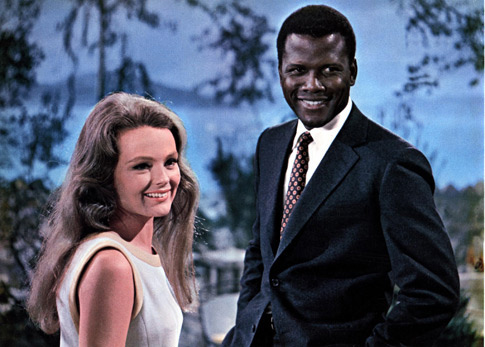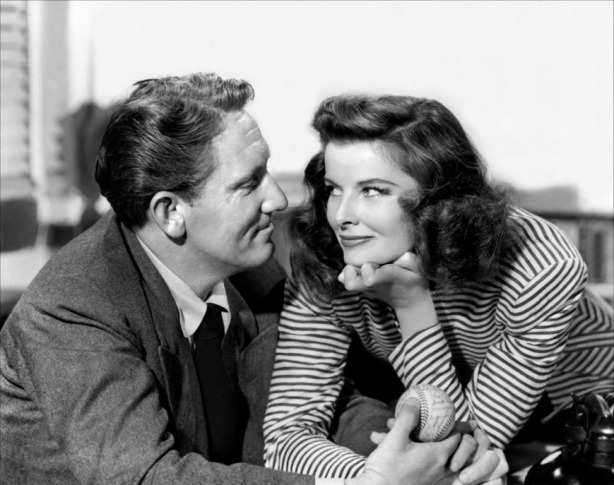One of my guarded writing techniques is that I rarely talk about a work in progress, but luckily for me, a number of my barriers are starting to break down. The few I’ve spoken with about Guess Who’s Coming to Dinner all asked some hue of the same question — has it held up after all these years? Since I was born 13 years after its release, I thought for a moment that I wasn’t exactly qualified to answer, but then I began to find the question pretty flattering. Those who asked are certainly aware of my birth year, and yet somehow my answer still carried with it a shade of authority . . . even if is just an opinion. For making an introverted writer feel fuzzy inside, I dedicate this one to you.
The first obligatory response to whether or not Guess Who’s Coming to Dinner has held up through the years has to be “go judge for yourself.” While that may not be the worst advice, it’s also the easy way out of taking a side and answering the question. I’ve always had trouble taking one side of an argument without seeing valid points of the other — if the grass is greener and we flock eagerly to that other side, then yes indeed, the world still cares about color and uses it as a tool of judgment. I believe that Guess Who’s Coming to Dinner is a very important movie, and it makes valuable points about the 1960s and beyond, but the subject matter is not what draws me in. If you’ve been kind enough to read some of my other entries (thank you, big hugs!), then you may safely assume that I’d follow a Katharine Hepburn film into the darkest of dangerous caves without any knowledge of its details. I guess I’m just as guilty of judging something by its wrapper, but if the wrapper has her name on it — let alone hers next to Mr. Spencer Tracy’s — I form an opinion immediately, without even opening the case. You see where I’m going with this, perhaps a little bit?
When Guess Who’s Coming to Dinner opens with the song The Glory of Love, I already have a smile on my face. The song reminds me instantly of Beaches (1988) and the unparalleled love I have for one Miss Bette Midler (visit my “About the Author” page for more on this lifelong obsession). In 1967 San Francisco, Joanna Drayton (played by Miss Hepburn’s niece, Katharine Houghton) returns home to her parents, Hepburn and Tracy’s Christina and Matthew, with her new fiancé John, played by a handsome Sidney Poitier. For those who recognize the name but cannot picture a face, Mr. Poitier is black, and every time his character is liberally referred to as “a negro,” I can’t help but wonder if “black” will some day be incorrect, politically speaking. My love of old movies reflects my personality a great deal, so it’s possible that I haven’t kept up with the times . . . if I’m so far out of the politically correct loop already and offending you, dear readers, you’ll let me know, I’m sure. Matthew and Christina’s liberalism does not result in the initial reaction they may have expected — Christina, although politely shocked at the beginning, comes around to the realization we expect rather quickly, while Matthew Drayton is not as easily convinced. Adding fuel to the simmering fire, Joanna invites John’s parents to dinner, who are unaware of Joanna’s lighter skin tone, and a fairly predictable storyline continues. A wonderful added bonus is the unforgettable voice of the family’s maid, played by Isabell Sanford who dropped that second “L” before landing her Emmy-winning role on The Jeffersons via All in the Family.
The predictability of the plot falls by the wayside for me, shadowed almost completely by the final journey Katharine Hepburn takes here with Mr. Spencer Tracy. The film’s sociopolitical messages have been discussed at length by many who know a great deal more than I about sociology, psychology, political science, and all those other subjects that I could never master in the schoolhouse. I could talk about the frequently used phrase “turmoil of the 60s,” about where I think now society is (or is not), and of course an easy route to take would be to draw a line from this film to the election of President Obama. But there was this odd contradiction that rose up in my pen when those thoughts first entered my mind — on one hand, I say there are others who are more qualified than I to address all those topics and more, and that’s true; but on the other hand, it seems like taking those routes while discussing this movie is just too easy . . . from all the voices I say, welcome to my brain!
While far from inconsiderable, the above mentioned topics (that are indeed part of what made the film as powerful as it was) do not even come close to affecting me as much as the moments when Hepburn glances at Tracy, knowing it may be for the last time. Spencer Tracy’s health was very poor in the late 1960s, and the insurance companies refused to cover him before and during the picture. At a very young age I learned that if I wanted to avoid an angry rant at the dinner table, I shouldn’t say the words “insurance companies” in front of Dad . . . but he was right, and here’s one more example of their wicked ways. Katharine Hepburn and director Stanley Kramer put their salaries in escrow as collateral, agreeing not to take a penny so their money could be used to make the film with another actor if necessary. Luckily for us all, Mr. Tracy made it all the way through filming by working half days, giving a performance of which only he was capable. If I were prone to gambling, I’d lay money on the possibility that his final ten-minute monologue was shot in one or two takes. And then on June 10, 1967, just ten days after filming was complete, the great Mr. Spencer Tracy died. He was 67 years old and wore a Fedora better than any other man on the planet.
Hepburn and Tracy sparkle once again, creating a scene simply by looking at one another. Who knows how they defined “love,” or how many definitions they had, or even if they defined it all, but what they shared with a grateful audience are some of the final loving moments between one of Hollywood’s greatest non-couples. The tears Miss Hepburn fails to hide during Spencer Tracy’s final monologue are some of the most authentic tears ever to saturate the screen, resulting in her second of four Oscars for Best Actress in a Leading Role. Mr. Tracy convinces us easily of the strong love that his character feels for his wife, and when he glances over at her, I almost feel like I’m intruding. It’s wonderfully heartbreaking when he assures us all that the “memories are still there — clear, intact, indestructible. And they’ll be there if I live to be 110.”
But the one moment that touches me more than any other in the film does indeed fill me with tears, but those tears result from the belly laugh that has me practically rolling around on the floor. When Matt confides in a friend about his daughter’s situation and the frustration he feels about his wife’s reactions to it, Mr. Tracy does the unthinkable — he does an imitation of Katharine Hepburn. Providing a hypothetical in which his daughter comes home with an undesirable fiancé of a different shade, Matt is positive that his wife would ask “where will we get enough roses to fill the Rose Bowl?” From the hard “R’s” to the soft and gentle landing on the “L” of “bowl,” it was only Mr. Spencer Tracy who could provide such an imitation of Miss Hepburn . . . an imitation filled with annoyance, love, and devotion.
So if you ask me (which some lovely people actually did), of course Guess Who’s Coming to Dinner holds up after all these years — the world has gone too far when it decides that Hepburn and Tracy are no longer in style . . .
Academy Awards for Guess Who’s Coming to Dinner (1968): Best Actress in a Leading Role, and Best Writing, Story and Screenplay Written Directly for the Screen




Katharine Hepburn’s 8th cousin, once removed, John David Sigler, went Home to be with the Lord at age 72. It was a blessing.
LikeLike
What a tearjerker! I haven’t even seen the movie. It’s going in the queue…
LikeLike
Hopefully there was a smile along with those tears! Maybe I should add a cautionary word or two at the beginning 😉
LikeLike
Yay, one I have actually seen! Though of course I didn’t know much of the back story, so now I should watch it again with that in mind…
LikeLike
me too! (regarding above comment.) i love the trivia and back story you offer up; watching this movie now knowing how ill Mr. Tracy was, for example, will give it special meaning. and, i got a little misty reading your take on the last monologue scene. sigh!
LikeLike
I have been inspired to watch the movies from your earlier reviews – and now I have another to add to my list – thank you and again the photos are are great!
LikeLike